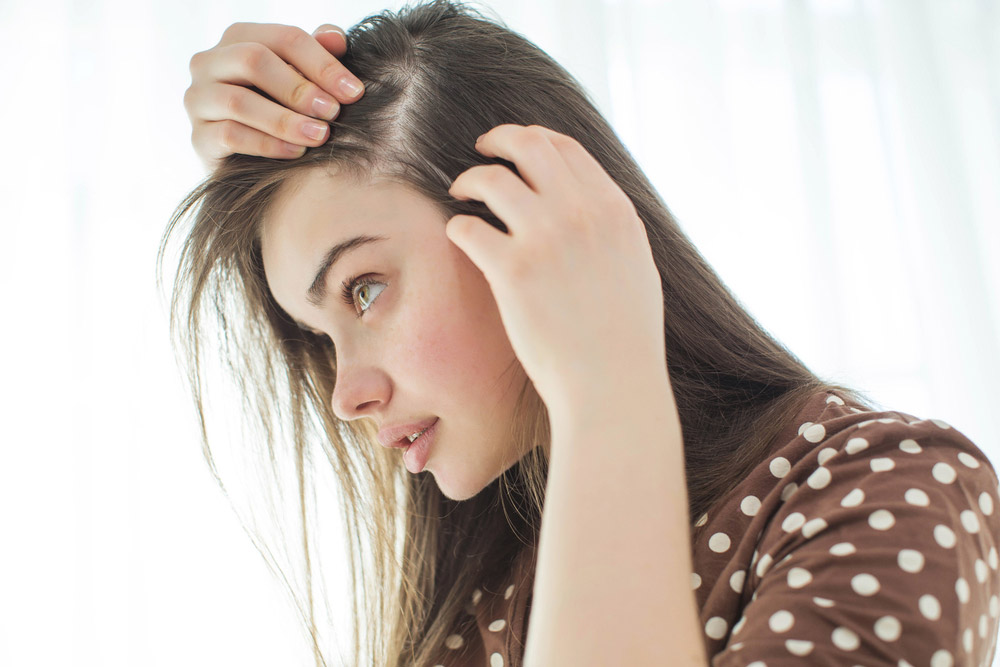Avoid Scalp and Hair Problems
With colder and drier months ahead, it is important to care for your scalp now more than ever. Winters can be particularly harsh to your scalp, leading to dry and listless hair. If you’re already experiencing hair loss or thinning of hair, these frigid months can be damaging to your mane’s raison d’être. Fortunately, a few simple steps at home can help you care for your scalp and hair even during the harshest of winter months.
In this article, we take a quick look at why winters are so harsh to your scalp and how you can avoid scalp and hair problems.
Winter months do not pity your scalp or hair
What happens to your scalp during winters?
to telogen phase (your hair stops growing and may fall out soon). It is also possible that people are less careful about cleansing their scalp during winters leading to excessive buildup. This too can lead to irritation, itching, and reduced quality of hair.
How to care for your scalp and hair at home during colder months
Cleanse and exfoliate your scalp – As winter months are generally cooler and people sweat a lot less, they may reduce the number of times they wash their hair per week. It is important to maintain a cleansing and exfoliating routine so that your scalp is ready to absorb nourishing products such as serums and oils. Exfoliating your scalp also helps to remove dead skin, which invigorates your hair follicles. As a result, you will experience reduced inflammation and improved your hair quality.
Hydrate and nourish your scalp – Massaging your scalp just before washing your hair can be an excellent way to encourage blood circulation and ensure hydration. Choose an anti-inflammatory oil such as extra virgin coconut oil or olive oil to adequately hydrate and nourish dry scalp, improve circulation, and encourage hair growth. Make sure to wash it off with a gently shampoo as oily scalp attracts dust and can be a breeding ground for fungi such as candida or malassezia. On the other hand, you can try RSB Neel Bhringadi Taila, which is an Ayurvedic hair oil that has empirical evidence to treat dandruff, encourage hair growth, and prevent hair loss and greying of hair.
Exercise and drink enough water – Exercise is not only important to look good but it also helps improve metabolism. A lot of skin and hair related issues are related to metabolism and general health. As exercise improves your general health and metabolism, it can have a direct effect on how your hair looks and feels. While you’re exercising, it is also important to increase your fluid intake. Drink at least eight glasses of water, and replenish with fluids whenever you sweat excessively. Regular exercising and remaining hydrated will keep your hair healthy, silky and glowing.
Eat nutritious foods – Eating right is crucial to maintaining hair growth and a healthy scalp. Make sure to get enough iron, vitamin A, and biotin through food sources such as flaxseeds, oily fish, kelp, and carrots. Although biotin is easily available in food sources such as nuts, bananas, whole grains, and cruciferous vegetables, some people need supplements to offset deficiencies. RSB Hair Essential Tablets deliver adequate levels of biotin to keep your scalp and hair healthy. In addition, these supplements also contain saw palmetto extract, which is scientifically proven to encourage hair growth.
Work on your stress levels – Stress can have a direct impact on scalp health and hair quality. High levels of stress is known to cause telegenic effluvium, a condition in which hair begins to fall out rapidly. Although this condition is common during periods of illness or as a reaction to certain medications, stress is another major contributing factor. Seeking therapy, exercising regularly, socializing with friends and family, and practicing mindfulness can all reduce your stress levels. Most importantly, a reduction in stress leads to healthy metabolism and general wellness, which reflects on your skin and hair as well.
Get professional help – If your hair loss is unmanageable despite doing all the right things we have listed above, you may need professional help. There are a number of in-clinic treatments that can improve the quality of your scalp and specifically target different kinds of hair loss. Moreover, many of these treatments help you maintain healthy hair that you already have, making it prudent to consider them as soon as you can. For instance, PRP for hair not only addresses severe
Platelet rich plasma (PRP) is a popular treatment for rejuvenating your skin and scalp. It is known to stimulate hair growth, while maintaining general scalp health. PRP treatment can also be customized to deliver essential hair growth components such as biotin. RSB’s Advance PRP Biotin is one such treatment. Low-level laser therapy (LLLT) is an evidence-based and painless treatment that reduces hairball and encourages hair growth.
Hair today, here tomorrow too
FAQs
What is the primary cause of hair loss?
It may be brought on by genes, hormonal changes, illnesses, or a natural aspect of ageing. Even though anyone can lose hair on their head, men are more likely to do so. Baldness often refers to a significant loss of scalp hair. The most frequent cause of baldness is hereditary hair loss as people age.
Which vitamin is good for hair?
Biotin. Your body’s cells require the vitamin B7 biotin. It can result in brittle nails, skin rashes, and hair loss at low doses.
What causes hair diseases?
Any of the following factors may contribute to hair disorders: Alopecia (nonscarring). Skin conditions, some medications, specific illnesses, autoimmune, an iron deficit, extreme stress, exposure to radiation on the scalp, pregnancy, or tearing at your own hair.

